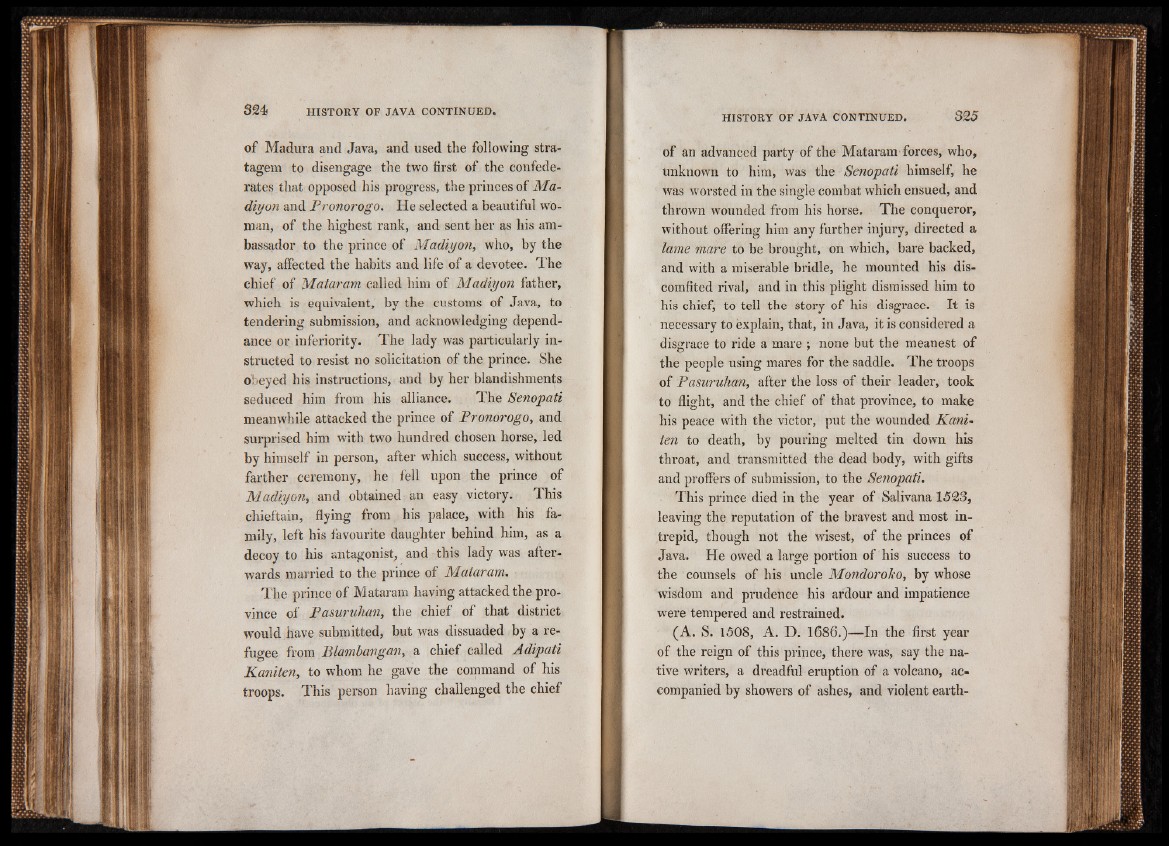
of Madura and Java, and used the following stratagem
to disengage the two first of the confederates
that opposed his progress, the princes of Ma-
diyon and Pronorogo. He selected a beautiful woman,
of the highest rank, and sent her as his ambassador
to the prince of Madiyon, who, by the
way, affected the habits and life of a devotee. The
chief of Mataram called him of Madiyon father,
which is equivalent, by the customs of Java, to
tendering submission, and acknowledging dépendance
or inferiority. The lady was particularly instructed
to resist no solicitation of the prince. She
obeyed his instructions, and by her blandishments
seduced him from his alliance. The Senopati
meanwhile attacked the prince of Pronorogo, and
surprised him with two hundred chosen horse, led
by himself in person, after which success, without
farther ceremony, he fell upon the prince of
Madiyon, and obtained an easy victory. This
chieftain, flying from his palace, with his family,
left his favourite daughter behind him, as a
decoy to his antagonist, and this lady was afterwards
married to the prince of Mataram.
The prince of Mataram having attacked the province
of Pasuruhan, the chief of that district
would have submitted, but was dissuaded by a refugee
from Blambangan, a chief called Adipati
Kaniten, to whom he gave the command of his
troops. This person having challenged the chief
of an advanced party of the Mataram forces, who,
unknown to him, was the Senopati himself, he
was worsted in the single combat which ensued, and
thrown wounded from his horse. The conqueror,
without offering him any further injury, directed a
lame mare to be brought, on which, bare backed,
and with a miserable bridle, he mounted his discomfited
rival, and in this plight dismissed him to
his chief, to tell the story of his disgrace. It is
necessary to explain, that, in Java, it is considered a
disgrace to ride a mare : none but the meanest of o 7 the people using mares for the saddle. The troops
of Pasuruhan, after the loss of their leader, took
to flight, and the chief of that province, to make
his peace with the victor, put the wounded Kaniten
to death, by pouring melted tin down his
throat, and transmitted the dead body, with gifts
and proffers of submission, to the Senopati.
This prince died in the year of Salivana 1523,
leaving the reputation of the bravest and most intrepid,
though not the wisest, of the princes of
Java. He owed a large portion of his success to
the counsels of his uncle Mondoroho, by whose
wisdom and prudence his ardour and impatience
were tempered and restrained.
(A. S. 1508, A. D. 1686.)—In the first year
of the reign of this prince, there was, say the native
writers, a dreadful eruption of a volcano, accompanied
by showers of ashes, and violent earth